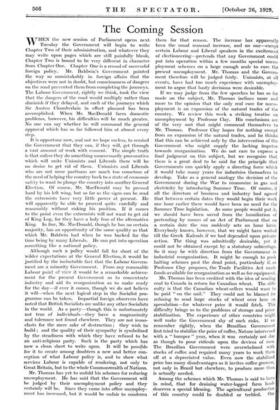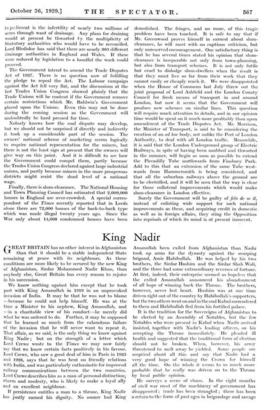The Coming Session
WHEN the new session of Parliament opens next Tuesday the Government will begin to write Chapter Two of their administration, and whatever they may write upon pages which are still painfully blank, Chapter Two is bound to be very different in character from Chapter One. Chapter One is a record of successful foreign policy. Mr. Baldwin's Government pointed the way so unmistakably in foreign affairs that the objectives were not in doubt, but consciousness of dangers on the road prevented them from completing the journeys. The Labour Government, rightly we think, took the view that the dangers of the road would multiply rather than diminish if they delayed, and each of the journeys which Sir Austen Chamberlain in effect planned has been accomplished. When Mr. MacDonald faces domestic problems, however, his difficulties will be much greater. No one can say whether he will command the general approval which has so far followed him at almost every step.
It is opportune now, and not we hope useless, to remind the Government that they can, if they will, get through a vast amount of work with consent. The simple truth is that unless they do something unnecessarily provocative which will unite Unionists and Liberals there will be no desire to get rid of them. Unionists and Liberals who are not mere partisans are much too conscious of the need of helping the country back to a state of economic • safety to want to plunge the country into another General Election. Of course, Mr. MacDonald may be pressed hard by his left wing, but so far -as the signs can be read the extremists have very little power at present. He will apparently be able to proceed quite carefully and reasonably without risking his position. If it comes to the point even the extremists will not want to get rid of King Log, for they have a holy fear of the alternative King. In fine, Mr. MacDonald, though he has no certain majority, has an opportunity of the same quality as that which Mr. Baldwin had when he was backed for the time being by many Liberals. He can put into operation something like a national policy.
• Although such a policy would fall far short of the wilder expectations at the General Election, it would be justified by the ineluctable fact that the Labour Govern- ment are a minority Government. From any reasonable Labour point of view it would be a remarkable achieve- ment for the. present Government so to concentrate industry and aid its reorganization as to make ready for the day—if ever it comes, though we do not believe it will—when the next logical step in the Socialist pro- gramme can be taken. Impartial foreign observers have noted that British Socialists are unlike any other Socialists in the world. As a party—though this is unfortunately not true of individuals—they have a magnanimity and tolerance not found elsewhere. They are not icono- clasts for the mere sake of destruction ; they wish to build ; and the quality of their sympathy is symbolized by the steadiness with which they have refused to be an anti-religious party. Such is the party which has now a clean sheet to write upon. It will be possible for it to create among doubters a new and better con- ception of what Labour policy is, and to show what services Labour is capable of rendering, not only to Great Britain, but to the whole Commonwealth of Nations.
Mr. Thomas has yet to unfold his schemes for reducing unemployment. He has said that the Government will be judged by their unemployment policy and they certainly will be. Since they came into office unemploy- ment has increased, but it would be unfair to condemn them for that reason. The increase has apparently been the usual seasonal increase, and no one—except certain Labour and Liberal speakers in the excitement of electioneering—pretends that any Government could put into operation • within a few months special unem- ployment schemes on a large enough scale to cure the present unemployment. Mr. Thomas and the Govern- ment therefore will be judged fairly. Unionists, at all events, have had too much experience with unemploy- ment to- argue that hasty decisions were desirable.
If we may judge from the few speeches he has so far made on the subject, Mr. Thomas inclines more and more to the opinion that the only real cure for unem- ployment is an expansion of the natural trades of the country. We review this week a striking treatise on unemployment by Professor Clay. His conclusions are of the very sort that might commend themselves to Mr. Thomas. Professor Clay hopes for nothing except from an expansion 'of the natural trades, and he thinks that this can be achieved only by the intervention of the Government who might supply the lacking impetus towards reorganization. We do not care to express a final- judgment on this subject, but we recognize that there is a great deal to be said for the principle that Governments can quickly apply a directing force which it would take many years for industries themselves to develop. Take as a general analogy the decision of the Government during the War to economize in gas and electricity by introducing Summer Time. Of course, if all the directors of business and industry had agreed that between certain • dates they would begin their work one hour earlier there would. have been no need for the Summer Time -legislation. As some people would put it, we should have been saved from the humiliation of pretending by means of an Act of Parliament that on a certain date the sun suddenly sets an hour later' Everybody knows, however, that we might have waited till the Greek Kalends if we had depended upon private -action. The thing was admittedly desirable, yet it could not be obtained except by a statutory subterfuge.
So it may be with direction from the Government in industrial reorganization. It might be enough to push halting schemes past the dead point, particularly if, as Professor . Clay proposes, the Trade Facilities Act made funds available for reorganization as well as for equipment,: Mr. Thomas has been credited with the idea of sending coal to Canada in return for Canadian wheat. The diffi.
culty is that the Canadian wheat-sellers would want to be paid "on the nail." They could not be blamed for :refusing to send large stocks of wheat over here on speculation—for whatever price it would fetal. This difficulty brings us to the problems of storage and price- stabilization. The experience of other countries might well make . the Government shy of such risks, if we remember rightly, when the Brazilian Government first tried to stabilize the price of coffee, Nature intervened with a " bumper " year, when it was certainly not due as though to pour ridicule upon the devices of men. The Brazilian Government were overwhelmed with stocks of coffee and required many years to work them off at a depreciated value. Even now the stabilized price has many disadvantages as it invites coffee growei* not only in Brazil but elsewhere, to produce more than is actually needed. Among the schemes which Mr. Thomas is said to have in mind, that for draining water-logged farm lands deserves a special blessing. The agricultural production of this country could be doubled or trebled. One in- pediment is the infertility of nearly two millions of acres through want of drainage. Any plans for draining would at present be thwarted by the multiplicity of Statutory authorities who would have to be reconciled. Lord Bledisloe has said that there are nearly 360 different drainage authorities in England and Wales. If these were reduced by legislation to a handful the work could proceed.
The Government intend to amend the Trade Disputes Act of 1927. There is no question now of fulfilling the pledge to repeal the Act. The Labour campaign against the Act fell very flat, and the discussions at the last Trades Union Congress showed plainly that the Trade Unions will be content if the Government remove certain restrictions which Mr. Baldwin's Government placed upon the Unions. Even this may not be done during the coming session as the Government will undoubtedly be hard pressed for time.
Nobody knows how the coal dispute may develop, but we should not be surprised if directly and indirectly it took up a considerable part of the session. The owners' national scheme of marketing seems logically to require national representation for the miners, but there is not the least sign at present that the owners will give way on this point. And it is difficult to see how the Government could compel them, partly because the Trades Union Congress declared against large industrial unions, and partly because miners in the more prosperous districts might resist the dead level of a national wage.
Finally, there is slum-clearance. The National Housing and Town Planning Council has estimated that 2,000,000 houses in England are over-crowded. A special corres- pondent of the Times recently reported that in Leeds alone there are 72,000 houses of the back-to-back type which was made illegal twenty years ago. Since the War only about 14,000 condemned houses have been demolished. The fringes, and no more, of this tragic problem have been touched. It is safe to say that if Mr. Greenwood proves himself in earnest about slum- clearance, he will meet with no captious criticism, but only unreserved encouragement. One satisfactory thing is that he has several times stated his opinion that slum- clearance is inseparable not only from town-planning, but also from transport schemes. It is not only futile but cruel to dislodge slum-dwellers when the result is that they must live so far from their work that they cannot easily or cheaply reach it. We were disappointed when the House of Commons last July threw out the joint proposal of Lord Ashfield and the London County Council for fresh means of transport in and around London, but now it seems that the Government will produce new schemes on similar lines. This question will require much attention to details, and in our opinion time would be spent on it much more profitably than upon amendment of the Trade Disputes Act. Mr. Morrison, the Minister of Transport, is said to be considering the creation of an ad hoc body, not unlike the Port of London Authority, to deal with all London traffic. Meanwhile, it is said that the London Underground group of Electric Railways, in spite of having been snubbed and thwarted in the summer, will begin as soon as possible to extend the Piccadilly Tube northwards from Finsbury Park. Add to this that an extension of the same Tube west- wards from Hammersmith is being considered, and that all the suburban railways above the ground are to be electrified, and it will be seen that the way is clear for those collateral improvements which would make slum-clearance in London effective.
Surely the Government will be guilty of felo de se if, instead of enlisting wide support for such national improvements as these, and acquiring credit in domestic as well as in foreign affairs, they sting the Opposition into reprisals of which its mind is at present innocent.



















































 Previous page
Previous page